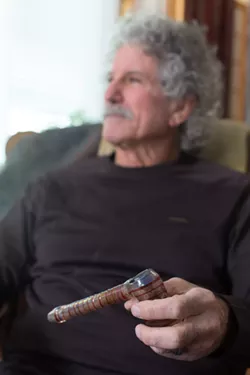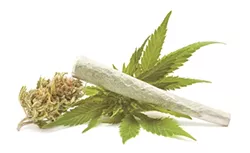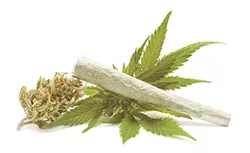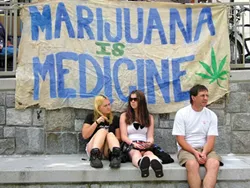Thursday, April 20, 2017
Like many of the great origin stories, the tale behind the digits "4/20" marks the beginning of the hero's journey.
4/20 is not a cop code, or Bob Marley's birthday nor does it have anything to do with Hitler's birthday (though he was born on April 20).
It's not the time of the day that you're supposed to smoke weed (though there's nothing stopping you from lighting up at 4:20). It's not the number of chemical compounds in THC, the active ingredient in marijuana, and it's not the numbers in that one Bob Dylan song multiplied.
No, the origin for the international indicator of all things marijuana — and what's become the unofficial Stoner Holiday — is much more unlikely.
The term 4/20 actually started with a group of bell-bottomed stoner teenagers in San Rafael, California. And just last month, the digits were added to the Oxford English Dictionary, where they will live on as the universal signifier referring "to cannabis or to the act of smoking cannabis." The dictionary credits a group of unlikely heroic teenagers for the term's beginning.
So the story goes, there was a group of dudes at San Rafael High School in Marin County, north of San Francisco. In the early '70s, they earned the nickname "The Waldos" because they would sit on a wall after school and smoke pot.
One day, a Waldo named Steve Capper tells Criminal podcast host Phoebe Judge, a buddy told him of a magical field of marijuana ripe for the picking. Apparently, Capper's buddy's brother was in the Coast Guard and had planted some marijuana in a field near the Coast Guard's Point Reyes Station. Concerned that he would get caught, the service member relinquished control of the mystical plot of pot, and the Waldos jumped on it.
"We were teenage boys," Dave Reddix, another Waldo, says on the podcast. "Are you kidding?"
So the Waldos hatched a plan to meet at 4:20 pm at the statue of Louis Pasteur on the high school's campus. The teens "fired up a doobie" and hopped in Capper's '66 Impala.
They didn't find the elusive patch of grass that first day, but for weeks and months afterward, they would pass each other in the halls.
"4:20 Louis," they would say with a knowing glance. And each day after school, their search would continue. Eventually, they dropped the "Louis."
The Waldos never found the weed field, but in the decades after high school, they started seeing the digits scratched into park benches and painted on signs across the country.
Reddix suspects that the term spread with the help of Grateful Dead bassist Phil Lesh. Reddix's brother, Patrick, managed a Dead side band, and they smoked with Lesh frequently, he tells the Huffington Post.
Reddix recalls hanging out at the Front Street rehearsal hall while Lesh and his bandmates practiced.
"So we used to hang out and listen to them play music, and get high while they're practicing for gigs," Reddix tells HuffPo.
Where's the proof, you say? The Waldos have documentation. Stashed in a safety deposit box in San Francisco is a school newspaper clipping and dated correspondences between them.
In a man-on-the-street-style article dated 1974, one of the Waldos was asked, "If you had the opportunity to say anything in front of the graduating class, what would you say?"
"4-20," he answered simply.
There are also several letters among the Waldos, including one from Reddix to Capper. Reddix rolled a joint, he tells Judge on her podcast, smashed it down and mailed it to Capper. In the letter dated 1975, he wrote: "PS a little 420 for your weekend."
Thursday, September 8, 2016

Kids, you might want to have a talk with your parents (or grandparents) about the pot.
That’s because a new study from the Centers for Disease Control and Prevention has found that in an era when cannabis use is becoming increasingly legal and socially acceptable, it’s older generations who are turning to the drug at a faster rate than others.
The study, based on a national survey, found that in 2014, 2.5 million people age 12 or older used marijuana for the first time in the last year, adding up to about 7,000 new users every day. However, the study found that marijuana use among people age 12 to 17 dropped from 8 percent to 7.4 percent between 2002 and 2014.
While the study found that people were more likely to use marijuana across demographics (i.e. sex, race, education, region), the biggest increase was among adults aged 55 and up. Between 2002 and 2014 the percentage of people using pot between the age 55 and 64 increased from 1.1 percent to 6.1 percent.
In fact, in 2014, the study found that people in the 35-44-year-old demographic were more likely than teenagers to use cannabis.
The reasons posited for the steady increase in pot use among older Americans have varied. Some accounts attribute it to seniors wanting an alternative to pain pills or aging hippies indulging in old habits. Anyways, here's a video of grandmas smoking weed for the first time:
Tags: Centers for Disease Control and Prevention , marijuana , News , Image , Video
Friday, June 17, 2016
A U.S. Senate committee just took a step toward helping the country’s increasingly lucrative marijuana industry access a service considered essential to pretty much every business: banking.
Recreational marijuana is legal in Washington, Colorado, Alaska and Oregon, and 25 states have approved it for medical use. But many producers and retailers of cannabis are forced to operate solely with cash. That’s because marijuana remains illegal in the eyes of the federal government, and because the feds regulate the country’s banking system, financial institutions have steered clear of pot-oriented businesses.
Although a handful of institutions, such as Numerica Credit Union, offer limited banking to pot businesses, it’s still a widely unbanked industry. Pot business owners have complained of having their bank accounts suddenly closed or having to take extra security measures to guard all their cash.
But Thursday the Senate Appropriations Committee passed an amendment on a 16-14 vote to the Financial Services and General Government appropriations bill that could change that. The amendment, sponsored by Oregon Sen. Jeff Merkley and Washington Sen. Patty Murray, is meant to stop regulators from prohibiting, penalizing or discouraging banks from offering their services to cannabis businesses that operate legally under their state’s laws.
Tags: marijuana , Patty Murray , News , Image
Tuesday, June 7, 2016
Almost everyone in America thinks that veterans should be able to use marijuana to treat post-traumatic stress disorder.
That’s the takeaway from a new poll from Quinnipiac University that found that 87 percent of American voters support allowing U.S. Department of Veterans Affairs doctors to prescribe marijuana in “pill form” to veterans suffering from PTSD.
The finding is notable because even though about half of U.S. states have legalized marijuana for medical purposes, the VA doesn’t allow physicians to prescribe, let alone discuss, medical marijuana. That’s because the federal government doesn’t recognize marijuana as having any legitimate medical benefit. Although Washington lawmakers updated the state’s medical marijuana law last year to make PTSD a qualifying condition, Congress has refused to ease restrictions that would allow VA doctors to recommend medicinal pot to vets.
Among other findings from the poll:
- 89 percent of voters support allowing patients to use medical marijuana if it’s prescribed by a doctor.
- 54 percent of voters said that marijuana should be outright legalized. Sixty percent of men support legalization, while 48 percent of women do.
- 62 percent of Republicans oppose legalization and 57 percent of voters over 65 oppose legalization.
Tags: Quinnipiac University , marijuana , U.S. Veterans Administration , News , Image
Friday, May 13, 2016
The number of fatal car crashes involving drivers who recently used marijuana doubled since the state legalized the drug, but there’s still no scientific basis for laws prohibiting people from getting behind the wheel after toking up.
Those are the two, seemingly contradictory, main conclusions of recently released research from the AAA Foundation for Traffic Safety.
According to the research, “The percentage of drivers involved in fatal crashes who recently used marijuana more than doubled from eight to 17 percent between 2013 and 2014.”
The researchers also took a look at the lab results for drivers arrested for impaired driving and concluded that the legal limits on impaired driving are largely arbitrary. In Washington state, a person is guilty of driving under the influence of marijuana if they have a THC blood concentration of 5.00ng or higher within two hours of driving.
However, AAA researchers found that there is no scientific evidence that drivers are impaired at a specific level of marijuana in the blood, pointing out that the drug affects different people in different ways and that some individuals can have high levels of marijuana in their system and be fine to drive. Others, according to researchers, may have low levels in their system and be unsafe to drive.
This is unlike alcohol, according to research, that’s been shown to increase a car crashes.
Another problem pointed out by the research is that someone’s THC level can drop below the legal threshold while waiting for a blood test. Currently, researchers at Washington State University are working on a breathalyzer to quickly detect marijuana in someone’s system.
Here is a video KIRO did a few years ago that highlights this problem:
Tags: AAA Foundation for Traffic Safety , marijuana , News , Image , Video
Tuesday, March 22, 2016
One of the most potent challenges to legal pot has been struck down — at least for now.
On Monday, the U.S. Supreme Court declined to take up a lawsuit brought by the attorneys general of Oklahoma and Nebraska seeking to strike down Colorado’s legal marijuana law. The lawsuit argued that Colorado's voter-approved ballot measure legalizing pot put it at odds with federal drug laws and that Nebraska and Oklahoma had become unduly burdened from marijuana spilling in from its neighbor.
“The State of Colorado authorizes, oversees, protects, and profits from a sprawling $100-million-per-month marijuana growing, processing, and retailing organization that exported thousands of pounds of marijuana to some 36 States in 2014,” reads a brief filed by Oklahoma and Nebraska. “If this entity were based south of our border, the federal government would prosecute it as a drug cartel.”
Although legal pot advocates claimed victory, The Denver Post reports that Nebraska and Oklahoma still have the option to take their case to a lower federal court.
Idaho has much stricter pot laws than Washington and Oregon, which have both legalized the drug, but state officials haven't signaled they're preparing to take legal action against its neighbors. Nevertheless, proponents of relaxed drug laws in Washington breathed a sigh of relief. The American Civil Liberties Union of Washington applauded the court’s ruling in a statement:
“The ruling helps give states the space they need to pursue new approaches to marijuana policy. In Washington state, with the implementation of I-502 thousands of adults are no longer being arrested for possessing marijuana and millions in new tax revenue are being used for prevention and public health education. Efforts to undo this progress are shortsighted and would be counterproductive.”
Tags: U.S. Supreme Court , marijuana , News , Image
Tuesday, March 1, 2016
Facebook is drawing a line, and apparently recreational pot shops are on the wrong side of it.
Despite the fact that either recreational or medical marijuana is legal is 23 states and the District of Columbia, owners of local recreational marijuana stores were confused when their Facebook pages disappeared without much explanation. Several shop owners told the Inlander that they were not given a warning, nor a specific reason as to why their pages — and photos, posts, comments and followers — are under siege.
Steve Burks, owner of Tree House Club in the Spokane Valley, says Facebook sent him an email saying his shop's page violated "Facebook Page terms," but did not go into specifics. He clicked on the link to contest Facebook's decision, but got no response and was forced to start an entirely new account. He lost about 20,000 followers.
According to Facebook's Community Standards, the site prohibits "any attempts by unauthorized dealers to purchase, sell, or trade prescription drugs, marijuana, firearms, or ammunition. If you post an offer to purchase or sell alcohol, tobacco or adult products, we expect you to comply with all applicable laws and carefully consider the audience for that content."
But in states where weed is legal, why are medical dispensaries or recreational shops being lumped in with "unauthorized dealers?" Some legal experts suspect it has to do with the product's legality at the federal level.
Although in general Facebook allows posts advocating for (or against) legalization or espousing health benefits of marijuana, a spokesperson clarified in an emailed response that posts advertising its sale are not allowed. Also, Facebook employees only respond to reports of adverse content, and do not actively monitor the site.
Thursday, December 31, 2015
Serra Frank plans to ring in the New Year by smoking a joint and very possibly being arrested.
Frank intends on committing an act of civil disobedience by lighting up a joint on the steps of the Idaho state capitol as part of rally protesting the Gem State’s marijuana laws, which remain significantly more restrictive than those in neighboring states.
The 33-year-old resident of Boise says she uses marijuana to treat a bladder condition and has lived in states that allow for medical uses of the drug.
“I want to live in a medical marijuana state,” she says. “But I want that state to be Idaho because Idaho is my home.”
Idaho does not have a law in place sanctioning the medical use of marijuana. Possession of the drug remains a misdemeanor in the state and a conviction can mean jail time and fines.
Earlier this year, Gov. Butch Otter vetoed a bill that would have allowed parents of children experiencing severe seizures to use cannabidiol oil, a marijuana byproduct that contains virtually no THC, to treat their conditions. Later, the governor issued an executive order creating a trial program to allow families to use an experimental drug extracted from marijuana to treat their condition.
Currently, a group called New Approach Idaho is collecting signatures for a ballot initiative that would create a medical marijuana program in the state and decriminalize the drug. Frank says she has little confidence that Idaho lawmakers will reform the state’s marijuana laws and she hopes that her protest will bring start changing attitudes of the public.
“Regardless of what people believe we need to be having a discussion about what’s going on and this is a way to discuss what’s going on,” says Frank of her planned protest.
Frank, the mother of three and the founder of a group called Moms for Marijuana, says she’ll give a speech about how civil disobedience has been used to create social change before lighting up a joint. She’s invited members of the press and law enforcement to attend. She says she’s been arrested for marijuana possession previously and already has bail lined up for her likely arrest tomorrow.
“Most people who support prohibition have not been affected by prohibition,” she says. “And what we are trying to educate people on is that prohibition affects everyone.”
Update: Frank was arrested on New Year's Day. After giving her speech, she pulled out a bag of marijuana, but was arrested before lighting up, reports the Idaho Statesman.
Tags: Serra Frank , New Approach Idaho , Marijuana , green zone , News , Image
Tuesday, December 29, 2015
On Monday, a federal judge heard arguments on a case that’ll have sweeping implications for one of the most vexing problems facing the legal marijuana industry: access to banking services.
At the center of the case is Fourth Corner Credit Union, a Colorado-based credit union set up specifically to provide much-needed banking services to the legal marijuana industry. Since states began relaxing marijuana laws, the nascent industry has had to operate using mostly cash, which has made it vulnerable to robberies and increased the need for security.
Spokane’s Numerica Credit Union offers accounts to marijuana growers and processors and retailers. Over the summer, Oregon’s MBank, which catered to the industry, announced it would stop offering its services. According to a survey from Marijuana Business Daily, 60 percent of pot business don’t have bank accounts.
With the blessing of Colorado’s governor and a state charter, Fourth Corner Credit Union applied for a master account with the Federal Reserve Bank. The bank denied the application after the National Credit Union Administration said it couldn’t provide Fourth Corner with insurance, reports the International Business Times. In response, Fourth Corner sued.
In court, Mark Mason, lawyer for Fourth Corner, argued that the State of Colorado uses Wells Fargo to deposit its tax revenue, according to the IBT, meaning the federal banking system is already servicing pot money.
“The Federal Reserve is not the enforcer of drug laws,” he said, according to the paper.
In court, the attorney for the Federal Reserve argued that federal law doesn’t even recognize medical marijuana and suggested that this was an issue that should be taken up by Congress, reports the IBT.
Judge R. Brooke Jackson seemed inclined to support this argument. From the IBT:
Judge Jackson empathized with Mason, saying, “I think there's a certain unfairness to allowing these big banks to serve this business and keeping you out.” He also noted he “wasn’t too impressed” with the Federal Reserve’s other stated reasons for denying Fourth Corner a master account, such as its lack of deposit insurance and absence of a relationship with an established bank. But he suggested that his decision in the case — which he hinted might be issued fairly quickly — could hinge on the fact that marijuana is still prohibited in the eyes of federal law.Update: In a follow up email, Numerica spokeswoman Elizabeth Giles noted that the credit union started providing banking services for marijuana retailers in October.
Tags: Numerica , Fourth Corner Credit Union , marijuana , green zone , Image
Thursday, December 17, 2015
Pot is becoming more legal. But the kids are alright (mostly).
Despite state marijuana laws becoming increasingly relaxed, there are fewer teenage potheads in the U.S., according to the results of a survey conducted by researchers at the University of Michigan.
Since 1975, the Monitoring the Future survey has probed the attitudes of middle school and high school students regarding drugs, alcohol and tobacco use. This year’s results found that in 2014 students in grades 8, 10 and 12 were less likely to use marijuana over the course of their lifetime, the last year and the last 30 days.
“This finding is unexpected in light of the positive publicity marijuana has received in recent years prior to the data collection in 2014, with several states allowing medical marijuana use and two states (Colorado and Washington) legalizing recreational use for adults,” reads the report.
The study also found that the proportion of 12th grade students who thought that marijuana use should be treated as a crime is at the lowest level ever recorded by the survey at 17 percent. Despite their more permissive attitudes toward pot, the survey still found that the number of students who are daily users of pot has decreased.
“In 2014 the prevalence of daily marijuana use declined in all three grades, with a significant decline in 10th grade,” reads the study, which calls for more research to analyze why use of the drug has not increased over the last few years. “The 2014 daily prevalence levels in grades 8, 10, and 12, respectively, are 1.0%, 3.4%, and 5.8%.”
Washington poised to get more marijuana stores
The number of marijuana retail stores in Washington could rise by 222 to ensure that medical patients have access to the drug.
The Washington State Liquor and Cannabis Board has received a recommendation from staff to raise the current cap of stores from 334 to 556, in response to an overhaul of the state’s pot laws. Earlier this year, Gov. Jay Inslee signed SB 5052, a bill that merged the state’s largely unregulated medical market with its recreational one. The legislation drew criticism from medical marijuana advocates that it would shut medical marijuana dispensaries and that patients would be ill served by getting their medicine from recreational stores.
First priority for licenses will go to applicants who sought a retail license prior to July 1, 2014, or were employed by a dispensary prior to 2013, have maintained a state and local business license and have paid taxes. The second priority will go to applicants who operate or were employed by a medical dispensary prior to 2013 and maintained business licenses and paid fees.
So far, the board received 1,194 retail applicants, 39 or which have been determined as meeting the first priority and 42 having been determined to fit the second priority. The board will also seek to increase the number of licenses in 10 counties with the highest medical sales. Seventy recreational stores have received an endorsement to sell medical marijuana.
Congress again tells feds to back off medical marijuana
The congressional appropriations bill to fund the government will renew language to prevent federal law enforcement agencies from using their resources to interfere with states that have enacted medical marijuana laws.
“The renewal of the Rohrabacher-Farr Amendment suggests most members of Congress are ready to end the federal government’s war on medical marijuana,” said Robert Capecchi, director of federal policies for the Marijuana Policy Project, in a prepared statement. “There’s a growing sentiment that the Justice Department should not be using taxpayer dollars to arrest and prosecute people who are following their states’ medical marijuana laws.”
When the language was first approved, it gave hope to medical marijuana patients facing federal drug charges that their cases would be dismissed. But the U.S. Department of Justice determined that the language was sufficiently vague enough to continue these prosecutions, notably against the Kettle Falls Five, an Eastern Washington family convicted of federal drug charges.
Pot advocates have called on Congress to enact the CARERS Act, which they say would bring a more lasting solution to conflicts between federal and state marijuana laws.
Tags: Kettle Falls Five , Marijuana Policy Project , http://www.inlander.com/spokane/cease-fire/Content?oid=2391698 , News , Marijuana , Image







![[Updated] Boise woman plans to protest Idaho's weed laws by lighting up in front of state capitol](https://media2.inlander.com/inlander/imager/u/blog/2648502/12390884_1002608253130816_5188501404917227760_n.webp?cb=1733827652)




